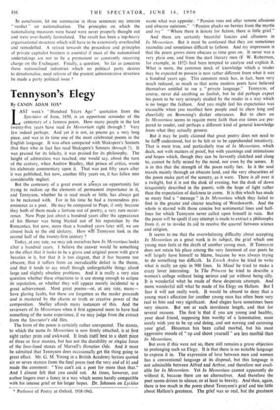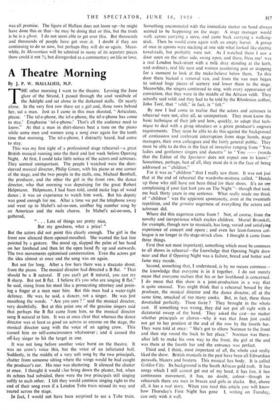Tennyson's Elegy
By CANON ADAM FOX*
LAST week's "Hundred Years Ago " quotation from the Spectator of June, 1850, is an opportune reminder of the
But the centenary of a great event is always an- opportunity for trying to reckon up the elements of permanent importance in it, and Tennyson, whether he is read much or little, has always got to be reckoned with. For in his time he had a tremendous pre- eminence as a poet. He may be compared to Pope, if only because they both of them made a fortune out of poetry, a very rare occur- rence. Now Pope just about a hundred years after the appearance of his Homer was being blasted out of his reputation by the Romantics, but now, more than a hundred years later still, we are almost back to the old idolatry. How will Tennyson look in the second half of the twenty-first century ?
Today, at any rate, we may ask ourselves how In Memoriam looks after a hundred years. I believe the answer would be something to the effect that it looks to be a grave and original poem with grelt beauties in it, but that it is too elegant, that it has become too obscure, that it suffers from an ineradicable defect in the theme, and that it tends to say small though unforgettable thing3 about large and slightly obsolete problems. And it is really a very nice question whether these objections to it are strong enough to eclipse its reputation, or whether they will appear merely incidental to a great achievement. Most great poems—or, at any rate, many— have glaring faults, but these are forgotten as the reader proceeds and is mastered by the charm or truth or creative power of the composition. Shelley affords many instances of this. And the reviewers of In Memoriam when it first appeared seem to have had something of the same experience, if we may judge from the extract from the Spectator's old files.
The form of the poem is certainly rather unexpected. The stanza, to which the name In Memoriam is now firmly attached, is at first sight rather prim and awkward. It lends itself best to a short piece of three or four stanzas, but has not the din-ability or elegiac force of the four-lined stanza of Marvell's Horatian Ode. And it must be admitted that Tennyson does occasionally get the thing going to great effect. Mr. G. M. Young in a British Academy lecture quoted six or seven stanzas from the final poem (not the very end of it) and made the comment: "You can't ask a poet for more than that." And I almost felt that you could not. At times, however, our author lingers over a fancy in a way which seems hardly compatible with his intense grief or his larger hopes. pr. Johnson on Lycidas
• Professor of Poetry at.Oxford, 1938-1943. wrote what was apposite: " Passion runs not after remote allusions and obscure opinions." "Passion plucks no berries from the myrtle and ivy " " Where there is leisure for fiction, there is little grief."
And there are certainly beautiful fancies and allusions in In Memoriam. But it must be confessed that they are sometimes
recondite and sometimes difficult to fathom. And my impression is that the poem grows more obscure as time goes on. It never was a very plain one, and from the start literary men (F W. Robertson, for example, in 1852) had been tempted to analyse and explain it.
What is more, the common stock of knowledge which a reader may be expected to possess is now rather different from what it was
a hundred years ago. This common stock has, in fact, been very much reduced, so much so that some modern poets have believed themselves entitled to use a " private language." Tennyson, of course, never did anything so foolish, but he did perhaps expect his poem to be very seriomsly studied by the reader in a way which is no longer the fashion. And you might feel his expectation was 'excusable when you recollect how people used to chew long and cheerfully on Browning's darker utterances. But to chew on In Memoriam seems to require more faith than our times are pre- pared to render, and perhaps a different kind of general knowledge from what they actually possess.
But it may be justly claimed that great poetry does not need to be full/ understood, but to be felt or to be apprehended intuitively. That is most true, and particularly true of In Memoriam, which deals, not with matters of proof, but with yearnings and intimations and hopes which, though they can be fervently clutched and clung to, cannot be fully seized by the mind, nor even by the senses. It is in this that the strength of the poem really lies. In it the soul travels mainly through an obscure land, and the very obscurities of the poem make part of the scenery, as it were. There is all over it a twilight, but it is not the dusk of evening, but the dusk of dawn (exquisitely described in the poem), with the hope of light rather than the expectation of darkness to come. It is this which has made so many find a " message in In Memoriam which they failed to find in the greater and clearer teaching of Wordsvilorth. And the whole is starred with those concise but sentimental lines and half- lines for which Tennyson never called upon himself in vain. But the poem will be spoilt if any attempt is made to extract a philosophy from it, or to invoke its aid to resolve the quarrel between science and religion.
It seems to me that the overwhelming difficulty about accepting In Memoriam as a great work is its subject, the grief which one young man feels at the death of another young man. if Tennyson does not retain his place among the very foremost of our poets he will largely have himself to blame, because he was always trying to do something too difficult. In Enoch Arden he tried to write what is really an epic in 900 lines. In Maud he tried to make a crazy lover interesting. In The Princess he tried to describe a women's college without being serious and yet without being silly. It is wonderful what he made of these desperate attempts. And more wonderful still what he made of his Elegy on Hallam. But I fear it will not really work. It would be absurd to deny that a young man's affection for another young man has often been very real to him and very significant. And elegies have sometimes been very sincere. But not at such inordinate length, and that for
several reasons. The first that if you are young and healthy, your dead friend, supposing him worthy of a lamentation, must surely wish you to be up and doing, and not nursing and caressing your gvief. Housman has been called morbid, but his most aggressive moods of " up and shoot yourself " are less morbid than In Memoriam.
But even if this were not so, there still remains a grave objection to prolonging such an Elegy. It is that there is no suitable language to express it in. The expression of love between men and women has a conventional language at its disposal, but this language is not admissible between Alfred and Arthur, and therefore not avail- able for In Memoriam. Yet In Memoriam cannot apparently do without it, because there are no alternatives. And therefore the poet seems driven to silence;' or at least to brevity. And then, again, there is too much in the poem about Tennyson's grief and too little about Hallam's greatness. The grief was so real, but the greatness
was all promise. The figure of Hallam does not loom up—he might have done this or that—he may be doing that or this, but the truth is he is a ghost. I do not seem able to get over this. But thousands and thousands of people have got over %it. I doubt if they are continuing to do so now, but perhaps they will do so again. Mean- while, In Memoriam will be admired in many of its separate pieces (how could it not ?), but disregarded as a commentary on life or love.





































 Previous page
Previous page